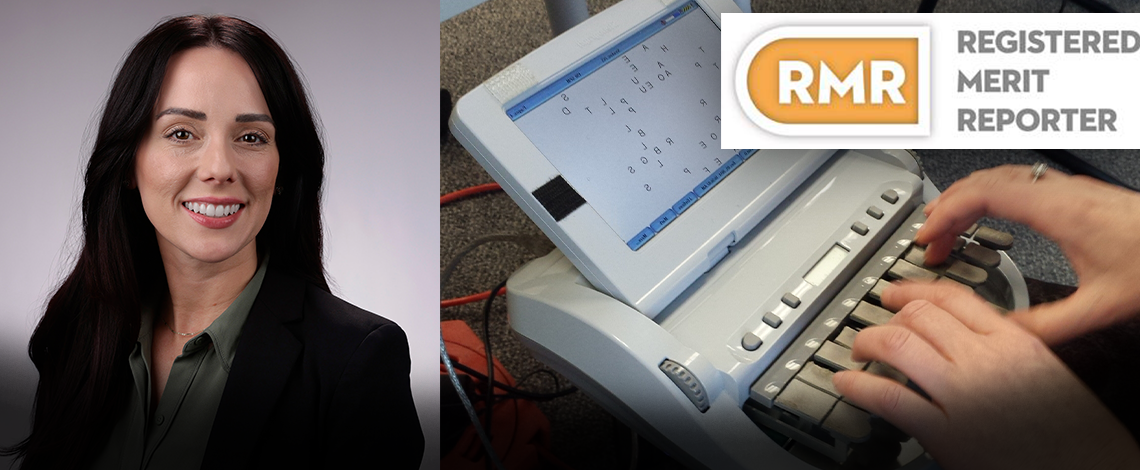
Rachael Lundy, a court reporter for the U. S. District Court, Eastern District of California, has earned her Registered Merit Reporter certification from the National Court Reporters Association. Reversed stenography machine photo on flickr by Mike Gifford under Creative Commons license, https://creativecommons.org/licenses/by-sa/2.0/ Photo illustration Cecilia Lopez
Written by Alex Light
Central Valley native Rachael Lundy has been awarded the nationally recognized Registered Merit Reporter (RMR) certification for her ability to produce a high-quality, verbatim record as a court reporter.
The RMR credential is given by the National Court Reporters Association (NCRA) to reporters and captioners across the country who have demonstrated themselves as top contributors to the profession for their reporting skills, transcript production, operating practices and professionalism.
RMRs are among the top stenographic court reporters in the profession and are often offered greater opportunities for challenging and lucrative job assignments, according to a news release from the NCRA.
Lundy is an NCRA member and has worked as a court reporter for 11 years. She is currently a court reporter for the U. S. District Court, Eastern District of California.
She said earning her RMR certification has been a source of relief.
“The ability to provide an accurate record at a high speed and have the skillset to perform this effortlessly is so valuable, both professionally and personally,” Lundy said. “It allows the freedom of having a stable work/life balance, reiterates the invaluable service stenographers provide for the judicial system, and most importantly, reaffirms the reasoning to have a seat in the courtroom.”
The NCRA currently has about 1,620 members who hold RMR certification, which requires transcribing up to 260 words per minute.
There is currently a shortage of certified shorthand reporters, with an estimated need for up to 458 full-time court reporters in California to join about 1,071 employed by the courts. Court reporters are required for juvenile and felony cases, according to a Judicial Council of California fact sheet from January 2025.
The court reporting and captioning professions offer viable career choices that do not require a four-year college degree yet offer good salaries and flexible schedules, according the NCRA.
Court-employed reporters’ median total salary plus benefits is estimated at $200,101 in California, according to the fact sheet.
The compensation comes with a duty considered crucial to the judicial process.
“Between Apr. 1, 2023 and Sept. 30, 2024, of 1,789,845 reported family, probate, and unlimited civil hearings in California, an estimated 1,281,770 hearings had no verbatim record (71.6%). The lack of a verbatim record will ‘frequently be fatal’ to a litigant’s ability to have an appeal decided on the merits,” according to the Judicial Council fact sheet.
“For example, victims seeking protective orders, such as victims of domestic violence or elder abuse, may have difficulty appealing the denial of a protective order because they don’t have a record. In civil matters, an appellate court may be unable to review a party’s claim of error in the trial court. In criminal proceedings, the lack of a sufficient record may impact a defendant’s constitutional rights of due process and equal protection.”
Court reporters and captioners rely on the latest in technology to use stenographic machines to capture the spoken word and translate it into written text in real time. These professionals work both in and out of the courtroom recording legal cases and depositions, providing live captioning of events, and assisting members of the deaf and hard-of-hearing communities with gaining access to information, entertainment, educational opportunities and more, according to the NCRA.








